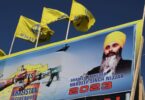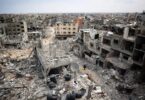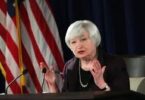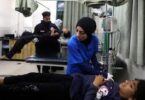LONDON (Agencies): Former UK Prime Minister Tony Blair was warned in the wake of 9/11 that the UK could suffer a terrorism incident “even more appalling” than the World Trade Center attack, the BBC reported on Wednesday.
Newly declassified documents show that Blair was warned in a letter by former Defense Secretary John Stanley that terrorists would likely use a dirty bomb to target Britain.
Stanley, who served under former Prime Minister Margaret Thatcher, said the government should act on the assumption that one or more British cities would be hit by weapons of mass destruction “in the near and foreseeable future,” The Times reported.
“I don’t need to tell you that if terrorist organizations succeed in using nuclear, chemical or biological WMDs in urban areas the number of deaths, the length of time it will take huge numbers of people to die, and the degree of excruciating pain suffered by the victims will all be vastly, vastly greater than anything we have witnessed in New York or Washington this week,” he added in the letter, which was sent days after 9/11.
Stanley told Blair that it “was not in the national security interest” to publicize the warning, with the matter kept secret within the government.
Though Blair immediately boosted precautionary measures at airports and government buildings across the UK after 9/11, Stanley said authorities should focus on measures to deal with WMDs, including stockpiling vaccines and anti-radiation supplies.
Stanley also proposed expanded government surveillance of potential terrorists, and the easing of detention regulations.
The series of declassified letters also reveal Blair’s reluctance to move against the coalition that was set up in the wake of 9/11 by launching an immediate invasion of Iraq.
The 2001 anthrax attacks in the US, which took place shortly after 9/11, proved another point of controversy.
At the time, the attacks were suspected to have been carried out based on similar motives to the World Trade Center strike, either by Al-Qaeda or Saddam Hussein’s Iraq, though seven years later a senior US microbiologist was named the sole perpetrator. Privately, however, Blair questioned whether the anthrax had been produced in Iraq.
Jonathan Powell, Blair’s chief of staff, said in a memo: “We had to be careful about throwing around allegations. He (Blair) would not be opposed to dealing with Saddam Hussein in due course.
“But we should not undermine the coalition by rushing into taking on Iraq now. The Muslim world was very fragile and we would probably lose France and Germany as well.”
The letters also show correspondence between Thatcher and Blair, with the former praising the latter over his support for the US in the wake of 9/11, The Guardian reported.
In one handwritten note from April 4, 2002, Thatcher said: “You will have found, as I did, that just as one international crisis subsides, another soon threatens.
“I greatly admire the resolve you are showing. You have ensured that Britain is known as a staunch defender of liberty, and as a loyal ally of America. That is the very best reputation our country can have.”
Stanley’s concerns over a potential deadly terrorist attack on Britain appeared to have been taken seriously by the Blair government, with actions taken behind the scenes to boost anti-terrorism measures.
But the changes were often made in secret, said David Omand, former security and intelligence coordinator in the Cabinet, due to concerns that the government could “put people in fear.”







